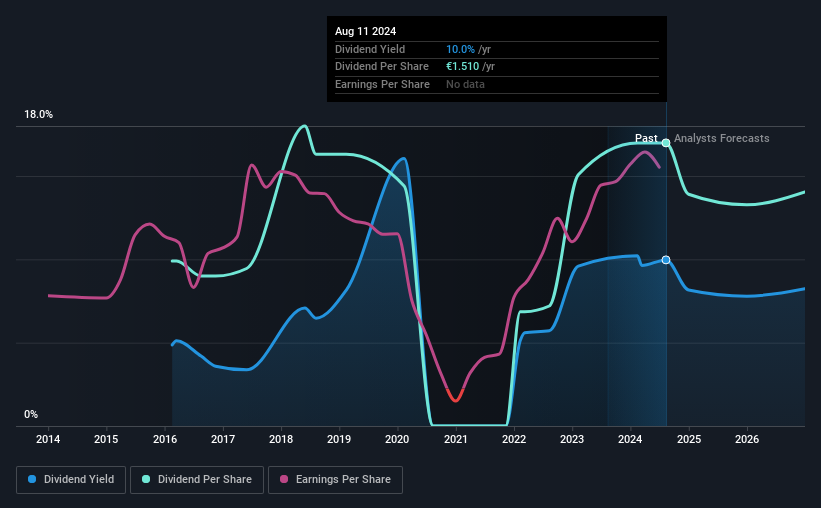
ABN AMRO Bank N.V. (AMS:ABN) has announced it will be reducing its dividend payable on the 11th of September to €0.60, which is 3.2% lower than what investors received last year for the same period. The yield is still above the industry average at 10.0%.
View our latest analysis for ABN AMRO Bank
ABN AMRO Bank's Earnings Will Easily Cover The Distributions
We like to see robust dividend yields, but that doesn't matter if the payment isn't sustainable.
ABN AMRO Bank has established itself as a dividend paying company, given its 8-year history of distributing earnings to shareholders. Based on ABN AMRO Bank's last earnings report, the payout ratio is at a decent 51%, meaning that the company is able to pay out its dividend with a bit of room to spare.
Looking forward, earnings per share is forecast to fall by 14.9% over the next 3 years. Despite that, analysts estimate the future payout ratio could be 47% over the same time period, which is in a pretty comfortable range.

ABN AMRO Bank's Dividend Has Lacked Consistency
Even in its relatively short history, the company has reduced the dividend at least once. If the company cuts once, it definitely isn't argument against the possibility of it cutting in the future. The dividend has gone from an annual total of €0.88 in 2016 to the most recent total annual payment of €1.51. This works out to be a compound annual growth rate (CAGR) of approximately 7.0% a year over that time. We like to see dividends have grown at a reasonable rate, but with at least one substantial cut in the payments, we're not certain this dividend stock would be ideal for someone intending to live on the income.
ABN AMRO Bank Could Grow Its Dividend
Growing earnings per share could be a mitigating factor when considering the past fluctuations in the dividend. ABN AMRO Bank has impressed us by growing EPS at 6.7% per year over the past five years. Earnings are on the uptrend, and it is only paying a small portion of those earnings to shareholders.
In Summary
Overall, while it's not great to see that the dividend has been cut, we think the company is now in a good position to make consistent payments going into the future. The payout ratio looks good, but unfortunately the company's dividend track record isn't stellar. This looks like it could be a good dividend stock going forward, but we would note that the payout ratio has been at higher levels in the past so it could happen again.
Investors generally tend to favour companies with a consistent, stable dividend policy as opposed to those operating an irregular one. At the same time, there are other factors our readers should be conscious of before pouring capital into a stock. For example, we've identified 2 warning signs for ABN AMRO Bank (1 makes us a bit uncomfortable!) that you should be aware of before investing. Is ABN AMRO Bank not quite the opportunity you were looking for? Why not check out our selection of top dividend stocks.
If you're looking to trade ABN AMRO Bank, open an account with the lowest-cost platform trusted by professionals, Interactive Brokers.
With clients in over 200 countries and territories, and access to 160 markets, IBKR lets you trade stocks, options, futures, forex, bonds and funds from a single integrated account.
Enjoy no hidden fees, no account minimums, and FX conversion rates as low as 0.03%, far better than what most brokers offer.
Sponsored ContentNew: Manage All Your Stock Portfolios in One Place
We've created the ultimate portfolio companion for stock investors, and it's free.
• Connect an unlimited number of Portfolios and see your total in one currency
• Be alerted to new Warning Signs or Risks via email or mobile
• Track the Fair Value of your stocks
Have feedback on this article? Concerned about the content? Get in touch with us directly. Alternatively, email editorial-team (at) simplywallst.com.
This article by Simply Wall St is general in nature. We provide commentary based on historical data and analyst forecasts only using an unbiased methodology and our articles are not intended to be financial advice. It does not constitute a recommendation to buy or sell any stock, and does not take account of your objectives, or your financial situation. We aim to bring you long-term focused analysis driven by fundamental data. Note that our analysis may not factor in the latest price-sensitive company announcements or qualitative material. Simply Wall St has no position in any stocks mentioned.
About ENXTAM:ABN
ABN AMRO Bank
Provides various banking products and financial services to retail, private, and business clients in the Netherlands, rest of Europe, the United States, Asia, and internationally.
Undervalued with adequate balance sheet and pays a dividend.
Similar Companies
Market Insights
Community Narratives


